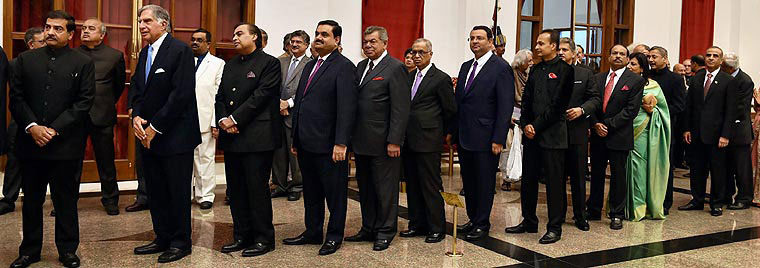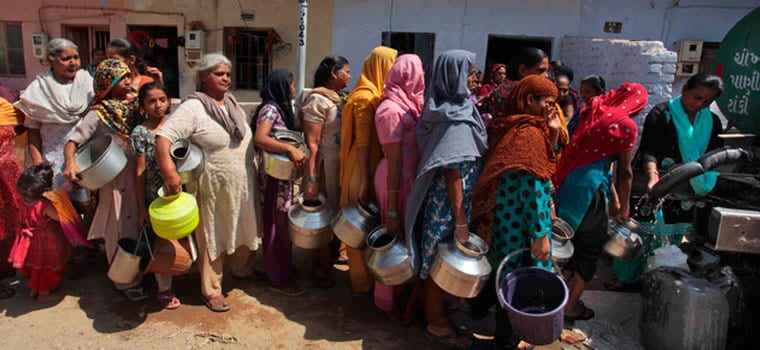From birth till death, defying the metaphysical karmic connection, good or bad, an Indian more often finds himself squeezed, intimidated and manipulated to “follow the line”. This line beats all sense of geometry, with its structure seldom befitting its definition. Sometimes it is a set of parallels, on occasions semicircular, most of the times serpentine and curling leaving the last man joining it, mostly directionless.

The Indian queue gives you a flavor of the place. Unstructured, disorganized and uncertain. The one who is a part of it, is perennially on high alert, always playing the guessing game; looking at the earliest opportunity to deflect to another window that might just open. Sometimes his unscrupulous sense looks out for helpers ahead in the line, to miraculously bail him out through their generosity. Flaring of tempers leading from minor to major scuffles is rampantly evident. A person’s success of reaching in front of the line almost always depends on his luck of the day. That’s because no sooner does the shutter open than the bookings get over. The one entrapped in the queue keeps hoping for it to be his day. Most places do have certain elite privileges where one can zoom over a large mass in exchange of extra money. Notwithstanding the fact that it does draw wretched looks and wrath of all who have been waiting for their turn and suspiciously bypassed.
[su_pullquote align=”right”]A structured queue is the starting point of an organization within oneself. This lead humans to coexist and collaborate better.[/su_pullquote]
Indian Airport’s follow the brahmanical tradition of education by rote. From the time one steps in, till he boards the plane, he almost does the same thing in every queue, albeit standing in 6 to 7 different ones. Funnily enough, each time that you are there, you go through the same routine. If in the 2nd and the 3rd queue one’s identity got checked, the 1st one did exactly the same, keeping you wondering what the last one was for. By the time you come to an end, you are almost certain to get a hang of the manner and method of this specific crash course of “being in and off line”, making you richer in patience and calm.
Potential “GAP MANAGEMENT” is something we have been taught as part of our sales management procedure. The queue is one place where you actually have to pull out all your learning and put them into action. Not leaving the slightest of gaps or space and allowing anybody sneaking in, is of paramount importance. Akin to not allowing competition squeezing in your territory. Here creativity beats logic, so it’s not always FIFO(First In First Out). Leaving as much space for the other, as is not due, is critically important. Even if it means to push and shovel and pick up fights. Sometimes this proximity can also lead to some bonhomie. Like-minded people embracing and sharing their camaraderie creating their own fiefdom within a restricted range.

The chaotic Indian queue is reminiscent of growing impatience, intolerance and is a reflection of a “man in a hurry”. Culturally it lives up to the spirit of the “end justifying the means” where everything boils down to the self before everything else. The fear of not making it leaves every Indian rushing and pushing, being insanely indifferent to the other around. From birth certificates to school admissions, cinema tickets, boarding queues, everywhere that one goes, he finds that a “sense of self” always supersedes a “sense of community”. Emerging from the fear of being left high and dry. Unfortunately this saga never ends. You move out successfully from one queue, only to find yourself stuck in another, never being able to exit this vicious circle.
In a land of 1.21 billion people with 364 persons every kilometer, space will always come at a premium and discipline falls prey to despondence. As the queues get complicated, life is getting poorer. Cohabitation and respect for each other’s space might become flawed concepts and the endemic rot of a dilapidating system doesn’t allow for such thoughts to sustain. In the West, it is not much about the “queue” as much as it is about the predictability of one achieving his objective if he stood in line. The evidence of certainty doesn’t allow anyone to trample upon the other. Thereby respecting each other’s space. The dichotomy however is that in an ultimate individualistic society there is an extreme sense of cohabitation and respect, especially for each other in public places. Some tacit and logical traits of “first come first serve” as well as “first in first out” does work successfully here. The success of it depending more on the orientation of its inhabitants as well as its evolved economic structure. Which in the larger sense of the word makes it more convenient and comfortable for its inhabitants.
In the words of the legendary George Mikes – “An Englishman, even if he is alone forms an orderly queue of one”. While the quote may sound funny, it does give an insight on the depth of discipline. A structured queue is the starting point of an organization within oneself. This lead humans to coexist and collaborate better. Where one good thing leads to another thereby all falling in line. It not only reflects a moral sense of respect for each-others space but takes a step forward in building an evolved and a matured society. A place where individuals or strangers combine to become an effective team.
How so ever we want, we can’t do away with the queue. Even if we were to try, we wouldn’t be able to just wish it away. Evolving out of a chaotic and complaining queue to a systemized one is something that every Indian should look forward and contribute to. In a land where red lit cars establish themselves as beacons of supremacy; where disparity and contrast rules the roost, it is the Queue that gets the rich and poor together. Managing oneself within the same with respect for another, could just be a happy beginning.

